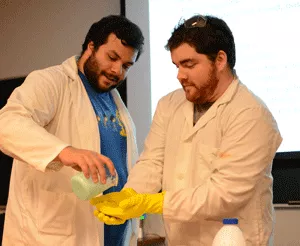
Science Showtime
What exactly is happening when a volcano erupts? How about that climate change? And what is up with the ozone layer?
Last Tuesday, undergraduate students working through the Research Opportunity Program (ROP) with Professors Marc Laflamme and Paul Piunno from the Department of Chemical & Physical Sciences at UofT Mississauga, addressed these questions among others, and treated attendees to their science show, which they intend to take on the road to nearby high schools.
This is all part of a summer-long project for ROP students to design portable science experiments for outreach initiatives with the goal of engaging youth in science.
“The idea was to come up with experiments that could fit into a small case or storage bin that we can wheel into a classroom and show students that science can be simple and fun,” says Laflamme.
ROP students Stephan Singh, going into his 4th year with a major in Chemistry and a double minor in English and Philosophy, and David Patch, now in his 5th year in Environmental Science and Chemistry, conducted separate presentations and a whole host of experiments covering some basics in chemistry and earth sciences respectively, such as catalysts and chemical reactions, quicksand and non-Newtonian fluids.
Along with the science experiments, Singh touched on forms of instrumentation to measure science outputs, and showcased his homemade spectrometer, which analyzed the concentration of a green compound in a liquid sample by measuring the intensity of light traversing vials containing the sample. Patch also presented a homemade spectrophotometer that analyzes the light released by a reaction over time. Patch's contraption relies on an Arduino board, an inexpensive piece of electronics growing in popularity amongst classrooms.
Additionally, Kate Driver, Jason Haddad, Monalaisa Elmoussa and Pavit Brar participated in the ROP project with Laflamme by building a bacterial metabolism-based board game that is now in a play-testing phase.
The presentations concluded with the students expressing their appreciation of their respective programs of study, and with their enthusiasm for UTM’s learning environment and the Research Opportunity Program. Lastly, Singh’s takeaway from something Laflamme said in a lecture was quoted a couple times as a source of inspiration for the students:
“We teach you the small things, so you can understand the big things, and you can change the world.”
